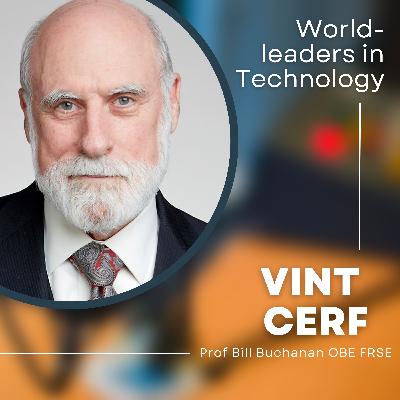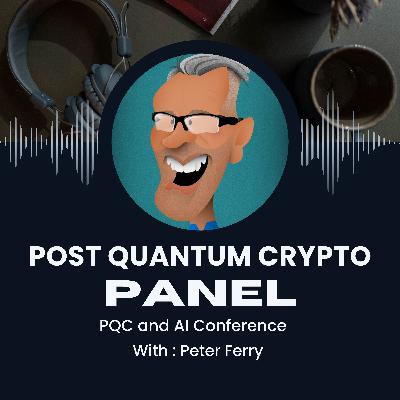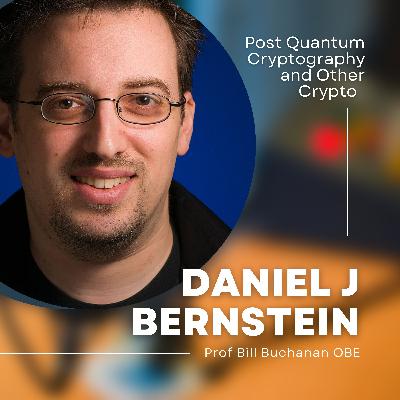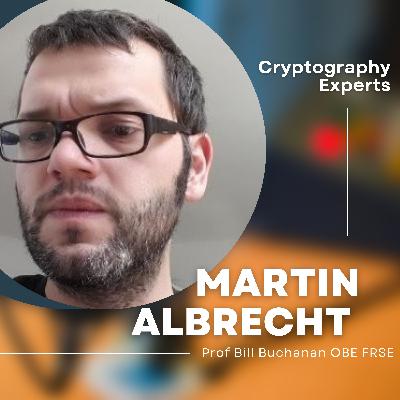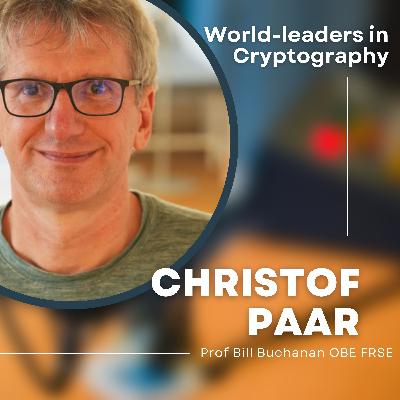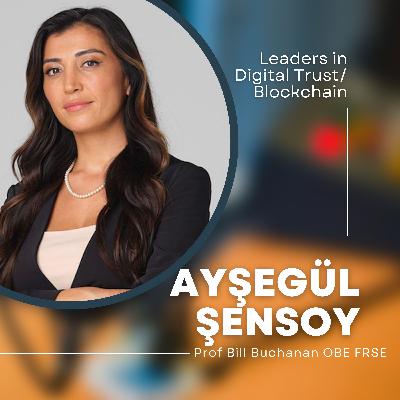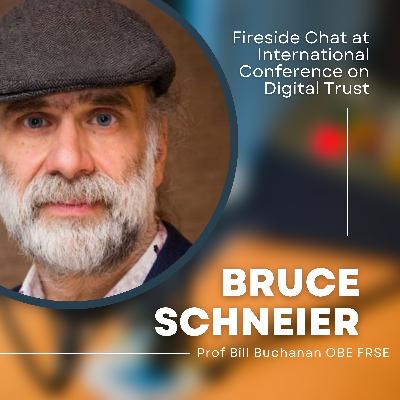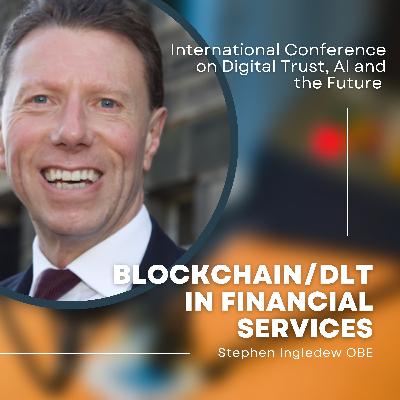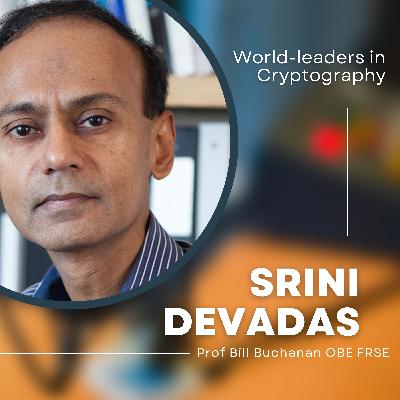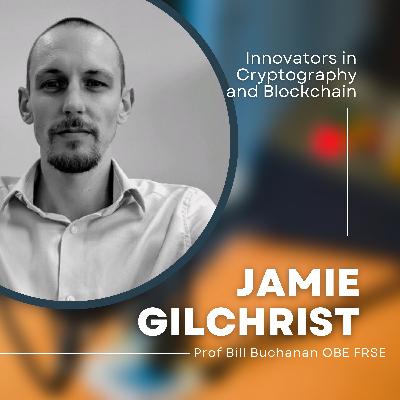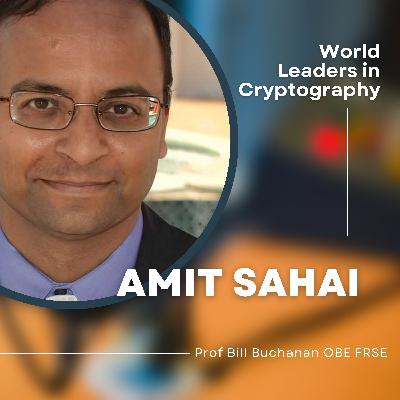Discover ASecuritySite Podcast
ASecuritySite Podcast

ASecuritySite Podcast
Author: Professor Bill Buchanan OBE
Subscribed: 10Played: 140Subscribe
Share
© 2023
Description
A security podcast is hosted by Professor William (Bill) Buchanan OBE, a world-renowned Information security professional and educator. Join Bill as he interviews and discusses the state-of-the-art with esteemed guests from all corners of the security industry. From cryptologists to technologists, each guest shares a wealth of experience and knowledge.
156 Episodes
Reverse
Vint is seen as one of the founding fathers of the Internet, and along with Robert Kahn, was award the ACM AM Turing Prize - the Nobel Prize of Computer Science - in 2004. Vint contributed to many areas in the creation of the Internet, including writing many RFCs (Requests For Comment) drafts, and in 1974 published the classic paper of "A Protocol for Packet Network Intercommunication" in the IEEE Transactions on Communications. This paper basically defined the IP and TCP protocols that would eventually be used to build the Internet. Along with the A.M. Turing Award, he received the National Medal of Technology from President Clinton in 1997, the Presidential Medal of Freedom from President George W Bush, and the Marconi Prize. Vint has Honorary Doctorates from over 27 universities, including ETHZ in Zurich, Yale University and the University of St Andrews. In 2012, he was induced into the Internet Hall of Fame, and, in 2023, he received the IEEE Medal of Honor for co-creating the Internet, and in sustained leadership in the creation of the Internet as critical infrastructure.
Panel Discussion: The Quantum clock countdown to Y2Q Peter Ferry, CEO Scottish Centre of Excellence in Digital Trust and DLT Amit Gupta, Founder and CEO ACubed.IT Mark Tehrani, Founder CyberSeQ Jan Willemson , Senior Researcher Cybernetica Estonia
A chat in the International Conference on PQC and AI. Daniel is a world-renowned computer scientist, one of the most influential figures in modern cryptography and a pioneer in post-quantum security.https://luma.com/9lxiupu6https://luma.com/9lxiupu6https://luma.com/9lxiupu6
Martin Albrecht is a Professor of Cryptography at King's College London and a Principal Research Scientist at SandboxAQ. He works broadly across the field of cryptography. His work focuses on the analysis of deployed or soon-to-be deployed cryptographic solutions and he has responsibly disclosed severe vulnerabilities to various public and private stakeholders such as OpenSSH, Amazon EC2, Apple, Telegram, Jitsi and Matrix. He further works on designing advanced cryptographic solutions. He is well known for analysing the security of lattice-based cryptography against classical and quantum computers.
Gilles has been a full Professor at the Université de Montréal for more than 45 years. He laid the foundations of quantum cryptography at a time when no one could have predicted that the quantum information revolution would usher in a multi-billion-dollar industry, much less that the United Nations would proclaim 2025 to be the International Year of Quantum Science and Technology. He is also among the inventors of quantum teleportation, which is one of the most fundamental pillars of the theory of quantum information. In addition to this, his research focuses on areas of classical cryptography, privacy amplification, quantum entanglement distillation, quantum pseudo-telepathy, the classical simulation of quantum entanglement, amplitude amplification and he discovered the first lower bound on the power of quantum computers. Currently, his main interest lies in the foundations of quantum theory. In 1996, he was elected to the Royal Society of Canada. In 2000, he won the Prix Marie-Victorin - the highest scientific award of the government of Quebec - and in 2006, he was elected as a Fellow of the International Association for Cryptologic Research. In 2009, Gille was awarded the Gerhard Herzberg Canada Gold Medal for Science and Engineering, and in 2011 the Killam Prize in Natural Sciences, which are Canada's highest scientific honours. In 2013, Gilles was elected as a Fellow of the Royal Society of London. He was named as an Officer in the Order of Canada in 2013 and in the Ordre national du Québec in 2017. In 2018, he became the first Canadian to receive the Wolf Prize in Physics, which is considered second only to the Nobel Prize for Physics. In 2019, he received the Micius Quantum Prize and the BBVA Foundation Frontiers of Knowledge Award in Basic Sciences. In 2023, he was awarded the Breakthrough Prize in Fundamental Physics - the world’s largest science prize. Furthermore, he has been granted honorary doctorates including from ETH Zürich, and the University of Ottawa.
Christof is a director at the Max Planck Institute for Security and Privacy in Bochum, Germany. He is also, a member of the German National Academy of Sciences Leopoldina and a Fellow of the IACR and IEEE. His research includes areas of light-weight cryptography, efficient cryptographic implementations, cryptographic Trojans and physical layer security. Christof is one of the co-creators of the PRESENT light-weight cipher and of the PRINCE block cipher, In 2003, he founded Escrypt GmbH together with Willi Mann-heims, and which was one of the first companies to focus on industrial data security. Since 2012, Escrypt has been part of Bosch.
Victor is a Senior Research Scientist at Nexus Laboratories. He received his PhD in Mathematics from Harvard University in 1975, and was an assistant professor at the University of Massachusetts Boston from 1973 to 1978. Victor has since worked for the IBM Research Center, The Institute for Defence Analyses in Princeton, Meta Platforms and SRI International. For his research, Victor has focused on areas of computational number theory, data compression and cryptography. Along with Neal Koblitz, he was the co-creator of Elliptic Curve Cryptography, the inventor of Miller's algorithm and was a co-inventor of the LZW data compression method. For the LZW invention, he was awarded the IEEE Millennium medal, and for his work on elliptic curve cryptography, he received the RSA Award for Excellence in Mathematics the Levchin Prize, and the Eduard Rhein Foundation Technology Award, along with being a member of the Information Systems Security Association Hall of Fame.
Aysegul Sensoy has over 20 years of management experience with blockchain, emerging technologies, fintech, business development, marketing and sales. She is currently the chair of the Istanbul Blockchain Women Association and CIS Regional Manager of Fuze Finance. She received her bachelor's degree in economics from Istanbul University and her master's degree in marketing communications management from Galatasaray University, as well as getting an executive MBA. She entered the tech sector after working in national and multinational companies as a marketing director, country manager, and many other roles. Aysegul is CIS (Commonwealth of Independent States) regional manager of Fuze Finance, an Abu Dhabi-based licensed fintech providing embedded digital asset capabilities for financial institutions. She was the Chief Strategy and Marketing Officer at XYZ Teknoloji, a blockchain-focused FinTech company based in Istanbul. Aysegul is a chairwoman and founding member of Istanbul Blockchain Woman, a non-profit association dedicated to empowering women in the blockchain ecosystem. The community's purpose is to organise social responsibility projects that will provide women with positive discrimination in terms of technology and blockchain. She is also a co-founder of the SOS Chain initiative, partners with needsmap.coop, which is a blockchain infrastructure fund for disasters and rapid humanitarian crises worldwide. Aysegul is leading the Euthenia community in Turkey, which is a Madrid-based organization aiming to increase C-level gender equity both in the Mediterranean and the MENA countries. She is also the co-founder of FairShare which aims to serve a transparent dApp, allows Muslim faithful to make their Zakat contributions crypto assets. More details on IBW: https://istanbulblockchainwomen.org/homepage/ If you are interested in the Trust4Futures Deep Skills Development course, you can find out more information here: https://trust4futures.com
A fireside chat from the International Conference on Digital Trust, AI and the Future. Bruce has created a wide range of cryptographic methods including Skein (hash function), Helix (stream cipher), Fortuna (random number generator), and Blowfish/Twofish/Threefish (block ciphers). Bruce has published 14 books, including best-sellers such as Data and Goliath: The Hidden Battles to Collect Your Data and Control Your World. He has also published hundreds of articles, essays, and academic papers. Currently, Bruce is a fellow at the Berkman Center for Internet and Society at Harvard University.
Federico Charosky, CEO Quroum CyberFederico is a seasoned cybersecurity executive with over 25 years of distinguished experience across the Americas, Europe, and the Middle East. He specialises in cyber risk management, security operations, and incident response, Federico has dedicated his career to safeguarding organisations against the ever-evolving landscape of digital threats. In 2016, he founded Quorum Cyber, a premier cybersecurity firm backed by private equity, headquartered in Edinburgh with offices across the UK, North America, and the UAE. At Quorum Cyber, our mission is to help good people win. With over 400 cybersecurity professionals and a global presence, our expert team of security engineers, incident responders, forensic specialists, and threat hunters leverages the best Microsoft Security technologies to defend organisations worldwide against cybersecurity breaches and attacks.
Chair: Stephen Ingledew OBE, Chair, Fintech Scotland Nishant Govil: MD, Innovation Adoption, BlackRock Kara Kennedy: Head of Digital Assets, JP Morgan Nick Jones: CEO Zumo. Dia Banerji: Imagine Ventures.
Date: 24 June 2025 Chair: Peter Ferry, CEO, TRUST Centre of Excellence. Martin Doherty Hughes: Former MP, Chair of All Party Parliamentary Group on Blockchain. Martin Trotter: Regtech leader, BRS Grant Thornton Martin Halford: CTO SICCAR and Tech Steering Committee Accord Project Chris Tate: CEO Condatis.
Vinod is a professor of computer science at MIT and a principal investigator in the IT Computer Science and AI Lab. He completed his Bachelor's degree from the Indian Institute of Technology Madras in 2003, and his PhD in 2009 from MIT. His main supervisor was Shafi Goldwasser. Vinod is seen as a world leader in the area of cryptography, especially within fully homomorphic encryption. He has co-authored many classic papers and which are seen as third generation of homomorphic encryption, including on "Trapdoors for hard lattices and new cryptographic constructions", and "Fully homomorphic encryption over integers". In 2022, he was a co-recipient of the Godel (Gurden) Prize. Vinod is also the co-founder and chief cryptographer at Duality Technologies.
Srini Devadas an Edwin Sibley Webster Professor of Electrical Engineering and Computer Science at MIT in the Computer Science and Artificial Intelligence Laboratory (CSAIL). His current research interests are in applied cryptography, computer security and computer architecture. Srini was awarded an a master's and a PhD degree in electrical engineering from the University of California at Berkeley - under the supervision of Arthur Richard Newton. He was an inventor of Physical Unclonable Functions (PUFs), and, In 2014, he received the IEEE Computer Society's Edward J. McCluskey Technical Achievement Award for the invention of PUFs and secure single-chip processor architectures. In 2018, Srini received the IEEE Circuits and Systems Society Charles A. Desoer Technical Achievement Award for the development of PUFs and enabling the deployment of secure circuits, processors and systems. In 2021, he received the IEEE Cybersecurity Award for Practice for the development of PUF, and the ACM SIGSAC Outstanding Innovation Award for fundamental contributions to secure microprocessors, circuits, and systems. In 2016, Srini won the Everett Moore Baker Memorial Award for Excellence in Undergraduate Teaching, Also, in 2016, he was named a MacVicar Faculty Fellow considered MIT's highest undergraduate teaching award.
Don Smith leads the CTU Threat Research group at Secureworks. His career starting with the creation of dns in 2005, and which was acquired by SecureWorks in 2009. He has extensive knowledge in cybersecurity and is seen as a world-leader in the field. Don is also the industry co-chair of the Strategic Cyber Industry Group in the National Cybercrime Unit at the UK National Crime Agency and a member of the UK National Cyber Advisory Board. He is also the co-chair of the Cyber League at the NCSC.
Jamie is the CTO at Umazi, the Head of Research at DataFair.ai and co-founder and CEO of Tunestamp.
Amit is a professor of computer science at UCLA and is the director of the Center for Encrypted Functionalities. Amit has been cited in his research work over 63,000 times and has an h-index of 91. In 2000, he graduated with a PhD from MIT and then moved to Princeton. In 2004, he then moved to UCLA. Over the years, he has made so many great advancements, including being the co-inventor of many areas of cryptography, including indistinguishability obfuscation schemes, functional encryption, attribute-based encryption, Zero-Knowledge Proofs and Multiparty Computation. In 2018, he was elected as an ACM Fellow for his work for the "contributions to cryptography and to the development of indistinguishability obfuscation", and elected as a Fellow of the International Association for Cryptologic Research for "fundamental contributions, including to secure computation, zero knowledge, and functional encryption, and for service to the IACR". In 2023, Amit received the Test of Time Award from the International Association for Cryptologic Research for his 2008 paper "Efficient Non-interactive Proof Systems for Bilinear Groups". Then, in 2022, he received the Michael and Sheila Held Prize from the National Academy of Sciences and which credits outstanding, innovative, creative, and influential research in the areas of combinatorial and discrete optimisation. And, in teaching, in 2016, he won the UCLA Samueli’s Lockheed Martin Excellence in Teaching Award.
Clifford Cocks is a British mathematician and cryptographer. While working at GCHQ, he invented public key encryption, and which predates the work of the RSA and Diffie-Hellman methods. He studied mathematics as an undergraduate at Kings College, Cambridge, and then joined the Communications-Electronics Security Group (CESG) at GCHQ in 1973. After his discovery of a usable public key encryption method, he went on to create one of the first Identity-Based Encryption methods and which is based on quadratic residues rather than bilinear pairings. In 2008, he was made a Companion of the Order of the Bath (CB). Then, in 2010, he and James Ellis and Malcolm Williamson were honoured by the IEEE for their part in the development of public key encryption. In 2015, he was elected as a Fellow of the Royal Society, and, in the same year, he received an honorary PhD from the University of Birmingham. Then, in 2021, Clifford was inducted into the Cryptologic Hall of Honour. Read more: https://medium.com/asecuritysite-when-bob-met-alice/so-who-invented-public-key-encryption-213ceef7759


